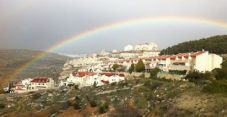 Everything you need to know about today’s coverage of Israel and the Mideast. Join the Israel Daily News Stream on Facebook.
Everything you need to know about today’s coverage of Israel and the Mideast. Join the Israel Daily News Stream on Facebook.
Today’s Top Stories
1. AP follows up on the status of Christians in the Gaza Strip. Their community is dwindling, and since Hamas took over, facing more pressure to convert.
The informal social pressure can range from strangers on the street urging them to embrace Islam to colleagues at work or university persistently discussing their Muslim faith with Christian colleagues. Particularly vulnerable to the advances are youth wanting to join Gaza’s wider society and gain greater opportunities for marriage and jobs — as well as unhappily married Christians, since conversion to Islam is one of the few ways to get a divorce from their Church marriages.
The community’s tiny size makes it difficult to maintain independent institutions that preserve their identity.
2. Assad regime: If the IDF attacks our non-conventional weapons stockpile, we’ll fire chemical weapons back at Israel. From the Times of Israel:
According to the report, Damascus would view any attack as a declaration of war and the regime would not hesitate to use chemical weapons on Israel. The sources told Al-Rai that an attack on the weapons depots would cause great pollution to the environment and kill anyone in the area, a scenario that would provoke an all-out conflict.
3. It was a busy day for Israeli Olympic widows Ankie Spitzer and Ilana Romano. Their a press conference was attended by AP, Reuters, AFP, NY Times, LA Times, Irish Times, and the Times of London (paywall) among others.
A Toronto Star staff-ed, a Philadelphia Inquirer op-ed, and LA Times sports columnist Bill Plaschke also threw in their support for a minute of silence. Plaschke writes from London:
Not once since that September day in 1972 has the IOC given the massacre’s survivors the honor or comfort of even one second of solemnity during the important and symbolic opening night.
After four decades, two widows have been sadly reduced to begging for it . . .
I’ll be standing. I’ll be silent. And for that entire minute, I’ll be noting the shame that will surround Rogge as he speaks of the Olympic spirit while clearly violating it.
Spitzer also appeared on CNN.
By the way, Palestinian Olympic Committee dissents.
Israel and the Palestinians
• The Independent passes the tissues and a tin cup for Salam Fayyad. I critiqued reporter Donald Macintyre’s interview earlier today.
• UN diplomat Robert Serry echoes the World Bank (whose findings were picked up on by the BBC and AFP). The PA economy can’t sustain statehood.
• Ismail Haniyeh and a delegation of Hamas officials and Gaza businessmen are meeting with Egyptian president Mohammed Morsi today. The Jerusalem Post reports that easing travel restrictions is but one item on Haniyeh’s agenda. Is this the beginning of a three-state solution?
Another source said that Haniyeh is carrying a plan to establish a free-trade zone along the border between the Gaza Strip and Egypt.

• Settler leader Dani Dayan got op-ed space in the NY Times. In a nutshell, Dayan argues that settlements have become too established to simply be uprooted.
Given the irreversibility of the huge Israeli civilian presence in Judea and Samaria and continuing Palestinian rejectionism, Western governments must reassess their approach to resolving the Israeli-Palestinian conflict. They should acknowledge that no final-status solution is imminent. And consequently, instead of lamenting that the status quo is not sustainable, the international community should work together with the parties to improve it where possible and make it more viable.
On a related note, the LA Times picks up on Israeli media reports on the rising settler population:
The number of Jewish settlers in the West Bank crossed the 350,000 mark for the first time, and most of the growth –- now about 4.5% annually –- is coming outside the major settlement blocs in areas that are not expected to become part of Israel under a two-state solution . . .
The figures do not include the nearly 300,000 Jewish residents who have moved into East Jerusalem and large developments around the Jerusalem area.
• Aaron David Miller (Foreign Policy) assesses the state Israeli-US relations, and the Obama-Netanyahu political dynamic.

